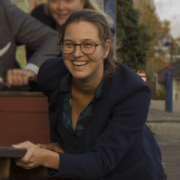How can we make relationships between people more sustainable?
Malou van Doormaal | TrainCamp Project
Malou van Doormaal | TrainCamp Project
As a group of priviledged professionals, we travel by train to a conference on sustainability. It seems logical to focus on the material world, mainly designed as a disposable society. But how sustainable are our social contacts?
The journey takes five days by train, but who benefits? We as artists of course, because we can do research, gain experience and expand our network. But when you talk about sustainability, it’s not just about what it delivers to you, but also about how nature, animals and other people can benefit.
I noticed that not only our physical world, but also our social networks are less designed in a sustainable way. In the past people were married for life and once you worked for a boss, you could often stay there until your retirement. Love and work relationships have become much more flexible. Friendships also changed a lot due to increasing mobility and have become less dependent on their place of residence. Contacts are easy to make through the internet, but also easily forgotten.
Another big change is the expansion of tourism. We in the Netherlands have become tourists. We are people who consume and use exotic locations for their own purposes. What is the connection with colonial activities? In this project we are going abroad to work. We are expats, labor migrants for one week. But what are the benefits for the local populations? Apart from some money, work and nuisance?
How can our temporary presence become sustainable? I want to investigate this during the trip and focus on the relationship with the people who provide us services. The staff on the train, waiters at the meetings, cleaning personnel, concierges and store employees at the trainstations for example. It immediately suggest a form of hierarchy, an unequal power relationship, based on status and money.
In what sense are these capitalist relationships sustainable? How do they deal with holistic thinking? Is it just convenient for us travellers to have this army of employees standing ready for us? Or are we being used as money generators in countries who more and more rely on tourism?
My first thought is to literally make myself available for help. As a kind of reverse service employee (such as a waiter, nurse or store employee). How can I help you? What can I do for you? Not something that gives instant satisfaction, but something that will still benefit someone in a few years.
By asking that question I hope to make contact. As a result, short interventions will arise. Maybe this consists of doing repairs, helping with the dishes, learning a language, solving arguments or making connections between people. I want to do this in defined time periods, since the journey is of course also divided into different moments. After the intervention has taken place, it can be sealed with a certificate.
I think such a format has a lot of potential for further development. Within the process before, but certainly also during the journey. It could lead to a collective action that is not only supported by me, but by several people.
Photo: Mike Harris
Artist
Malou van Doormaal challenges the status quo by making absurd and poëtic situations.
As an artist with a background in social work, most works involve interaction with people to question the usual within communities.
Malou graduated in 2014 from AKV St. Joost in Den Bosch and collaborates with Academie Voor Beeldvorming to realize this project.
